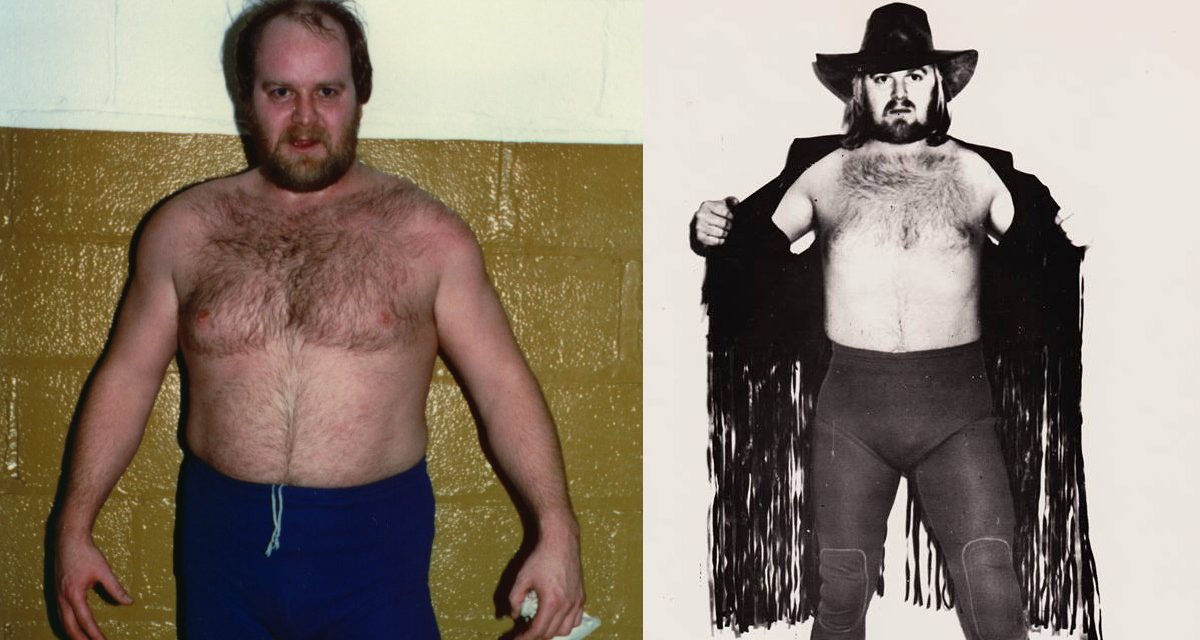“No Class” Bobby Bass is a name that old-time Canadian wrestling fans will remember. He worked the Canadian territories from coast to coast including B.C., Stampede, Toronto, Montreal, and the Maritimes. SLAM! Wrestling recently sat down with Bass to listen to some stories from the road.
Bass started his career in 1967 after he trained under the guidance of Phil Watson. Reflecting back on his wrestling career he is optimistic and saddened for the future of professional wrestling.
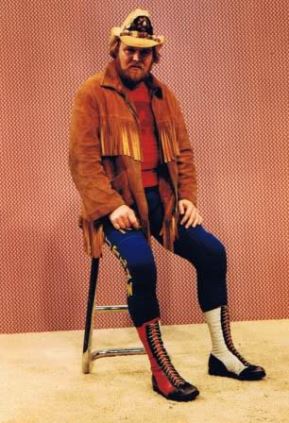
“No Class” Bobby Bass takes a seat during his run in Montreal.
In the 1960s and 1970s wrestling was more black and white as opposed to today’s shades of grey. “It was bad guy versus good guy,” said Bass. “We kept them on the edge of your seat week after week on the TV show and I look back on it now and it was so simple.”
Straightforward characters and storylines made it very clear to the audience who they should cheer and who they should jeer. Not only that, but wrestlers were able to work on their craft because of the high volume of shows and territories. A young talent could quickly blossom from a greenhorn to a good hand in a short time because of the vast ring experience they were given.
“There was a thing called the territories and they aren’t here anymore,” recalled Bass. “I feel sad for the kids today with all of this great talent, but they work what, once or twice a month? We worked seven days and twice on Sundays. We learned our trade and we learned how to work a crowd, when to do things and when not to do things. I see the kids today working so hard to get the audience over and I don’t think you have to work that hard. If you know how to read a crowd and work a crowd you worked your gimmick. ‘No Class’ Bobby Bass was a character and we worked that but we never spit, never swore, never grabbed yourself, never did none of that. Those days if you did that you were gone.”
It is easy enough to credit ring time for the talent’s improvement, but there were the mentors in the office and in the locker rooms that guided the youngsters. “Al Tomko and Gene Kiniski (B.C. promoters and wrestlers), they wanted it to be family entertainment but not just a headlock,” said Bass. “They wanted it up and down and if you went an hour then you went an hour. God forbid you sit in a headlock for five minutes you would hear about it. You had guys like the great Roy McClarty, he was a big babyface on the west coast. He was a great guy. He had me ride in the ring truck with him. I set the ring up and then I would get in the ring with him and you would learn. I knew my trade when I went to B.C., but when I went to Calgary I was a polished worker.”
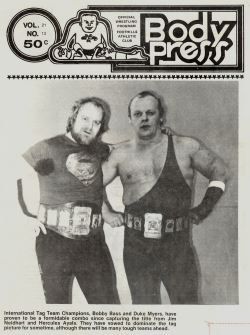
Bobby Bass and Duke Myers in Stampede in 1980.
Like many wrestlers of his era, he sees Vince McMahon as a great businessman, but also as the person who killed the business he loved. “I wake up every day and thank God that I did pro wrestling,” said Bass. “I fulfilled my dream and now it is time for me to step aside. Vince McMahon is a great guy, but the kids don’t realize that he killed every territory. He bought their TV and everything. Now you can’t go no place because of Vince McMahon and you’re kissing ass, saying he’s great? You’re never going to get into the WWE, mark my words, it is one in a thousand maybe. He had his pick of whoever he wants. I worked for him and Gorilla Monsoon, he liked me. The reason these guys are doing weekend jobs is because of Vince. I said that right to his face.”
In wrestling you have to accentuate the positives and Bass did so. He realized he could anger the audience on the microphone. Also, he discovered he could agitate the crowd by stalling so by the time the good guy touched him the audience was ready for his blood.
“I was a walker and talker and it got me over,” said Bass at a recent Crossfire Wrestling show in St. Catharines, Ontario. “I had the mouth, I could work, but it was easier for me to agitate the crowd and get them going. Jake ‘The Snake’ Roberts said to me in B.C., and I was the top heel so they put me and Jake together, he said, ‘I can’t believe it. We have a 25-minute match but we’re only working 15 minutes in the ring. I can’t believe what you do and how you get away with it.’ I told him that I didn’t either but it works. Me and Jake had battles up and down the west coast.”
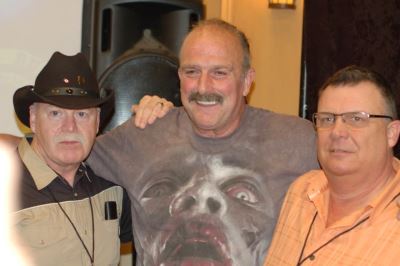
Bobby Bass, Jake Roberts and Bob Wayne at the 2012 Cauliflower Alley Club reunion. Photo by Yves Leroux
Bass liked to rile up the crowds and one time it got him a job. Pat O’Connor was the promoter in Kansas City, and he told Al Tomko about Bass. “Al brought me in for three weeks. He said to me, ‘Three weeks and you’re gone,'” recalled Bass. “The first night we are in Victoria, B.C., and I used to wear the cowboy hat, the vest, the chaps. They were playing “O Canada” so I pulled out this big Cuban cigar and puffed on it. The people went nuts, and the chairs started coming. I looked over at Al Tomko and he went, ‘Holy sh–, what have I got!’ I was there three and a half years. I was never a big-headed guy, just one of the boys.”
One person who irked Bass was the Iron Sheik. Bass was disgusted with his lack of character and refusal to put over others when it made sense to do so. “That goof ball Iron Sheik came in,” remembered Bass. “I didn’t like him and he didn’t like me. We were tag team partners (in B.C.) and we did a cage match against Dutch Savage and Bob Remus (a young Sgt. Slaughter) and (Sheik) said that, ‘I don’t do no friggin’ jobs.’ We know that … he made a big fuss about it and said, ‘You do the job.’ I don’t mind doing it. When you leave I’ll get my heat back. No big deal. I got juice and I got beat. When he was gone I got my heat back. Guys who think the business is all about them, think again, you are only as good as the person you are working with. If some guy is going to be a big show off he is going to do what he wants only to make himself look good.”
Bass was not the only one who thought this way. At the Niagara Falls Comic Con, legendary world champion Ric Flair once replied to a question about why he let so many guys beat him in a very succinct way. “It wasn’t worth arguing about,” replied Flair. “I’ll outperform everyone and people are going to go home saying, ‘Holy sh–, he is so much better than the other guy.’ If you worry about winning and losing you won’t stay very long.”
There are times when a professional wrestler must consider what is right for his character. If his character is destroyed by a severe beating from an opponent that is not realistic it could kill off a wrestler’s connection with the fans.
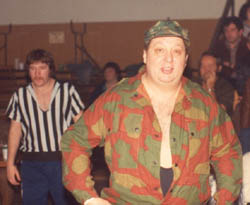
Here comes Master Sergeant Al Tomko!
“Al Tomko, the biggest mistake he had was coming back as Master Sergeant Al Tomko,” said Bass. “It killed the territory. When I was leaving he asked me to put him over and I said no. I’ll tell you why. It would have been an embarrassment for me, an embarrassment for Al and embarrassment for the company. I did chain matches, cage matches, 2 x 4 matches and I don’t know if you know what Al looked like but he was a dumpy little guy. It just wasn’t a match that people would believe in. I said, ‘No, I’m not doing it Al.’ He said, ‘Then you aren’t a businessman.’ I said, ‘Yes I am.’ I didn’t work with his sons, but I wouldn’t have put them over because they hadn’t put the time in the ring. Just because you are the promoter’s son doesn’t mean you are a main eventer. Pay your dues in the ring.”
One wrestler that Bass did connect with was the high-flying innovator, “The Dynamite Kid” Tom Billington. “He was rough, he was tough, but he was light with me,” said Bass. “We met in Japan and he couldn’t believe the match we put together. We called the match in the ring. In the dressing room we called the finish, that was all we needed, went in there. The Japanese guys couldn’t believe that we never worked before. We were two pros who knew how to call a match, knew how to work the audience and we did it, it was no big deal. We were over about eight weeks and they brought me back nine times.”
At times Dynamite Kid could be hard to get along with, but not with Bass. “We had a good working relationship and a good friendship,” said Bass. “He liked me and I liked him. There was no, you’re better than me, I am better than you and don’t forget we were both young, full of piss and vinegar.”
The most memorable bout for Bass and Dynamite Kid came at Toronto’s Maple Leaf Gardens, on October 23, 1984. Travel issues derailed the scheduled opponents for the British Bulldogs, so Bass teamed with Goldie Rogers for a bout. “The main event was Angelo Mosca against the Iron Sheik that was as slow as molasses,” said Bass. The Bulldogs versus Bass and Rogers went on after the plodding Mosca-Sheik match, and before an equally slow main event of Andre the Giant beating Kamala in a steel cage match. Bass still marvels at the bout they had. “There was a dive off the top rope on to a table. I see the kids today calling the matches in the back. What are you doing? Call it in the ring. Feel the crowd, work with the crowd, that’s what we did. If you call a match seven nights of the week in the ring, you get pretty damn good at it.”
Bobby Bass loved his life in wrestling and is forever thankful that he was a part of such a unique business. When you see Bobby Bass at a wrestling show, perhaps he will be wearing his trademark red shoes and cowboy hat; you should pull up a chair and listen to his stories, advice and wrestling wisdom.
RELATED LINKS
- Feb. 23, 1999: Newspaper ad led to career of ‘No Class’ Bobby Bass
- April 17, 2012: Bobby Bass Guest Column: Laughing my way through the Cauliflower Alley Club reunion
- Aug. 27, 2017: Facing the champs: Bobby Bass reminisces
